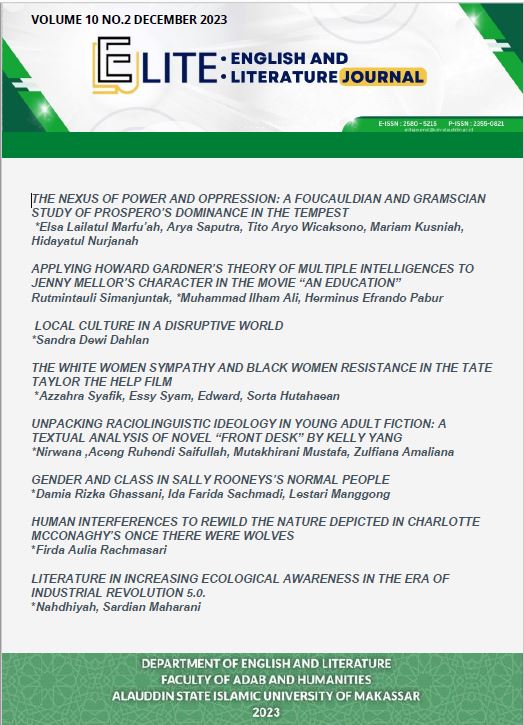English
Abstrak
Penelitian ini berfokus pada dinamika kekuasaan dan struktur hegemoni dalam karya William Shakespeare, "The Tempest," dengan berfokus pada dominasi Prospero atas subyeknya, Ariel dan Caliban. Berlandaskan pada teori relasi kuasa Michel Foucault dan hegemoni milik Antonio Gramsci, peneliti mengungkap kekuasaan Prospero dalam narasi The Tempest telah melampaui pemaksaan fisik, melibatkan manipulasi unsur budaya, politik, dan ideologis. Temuan ini membuka ruang bagi monopoli kekuatan yang diwujudkan melalui otoritas, penindasan, dan penerapan kontrol budaya dan intelektual dalam konteks hubungan tuan-hamba. Prospero, sebagai tuan, menggunakan bahasa dan narasi manipulatif untuk menegaskan dominasinya atas Ariel dan Caliban, berujung pada kontrol fisik dan psikologis. Tema penindasan dan kolonialisme dalam lakon ini diungkapkan dengan jelas, terutama melalui perbudakan atas karakter Caliban dan Ariel, turut disoroti pula perlawanan mereka terhadap ketimpangan relasi kuasa yang ada. Penelitian ini berkontribusi dalam memahami hubungan kekuasaan dalam karya sastra dan implikasi berkelanjutannya terhadap dinamika sosial kontemporer. Pada akhirnya, permainan kekuasaan dan penindasan dalam "The Tempest" memberikan pandangan mendalam untuk menilik ulang kerumitan kekuasaan dalam spektrum kehidupan manusia, memperkaya pemahaman kita tentang dinamika kekuasaan dalam sastra dan signifikansinya dalam isu-isu sosial kontemporer.
##plugins.generic.usageStats.downloads##
Referensi
Arcilla JR, F. E. (2023). Exploring the Dichotomy of Power and Oppression in William Shakespeare's The Tempest: A Formalistic Analysis. Journal of Namibian Studies: History Politics Culture, 34, 1016-1034. https://doi.org/10.59670/jns.v34i.2071
Adamson, W. L. (2014). Hegemony and Revolution: Antonio Gramsci's Political and Cultural Theory. Vermont: Echo Point Books & Media.
Bloom, H. (Ed.). (2008). Bloom’s Shakespeare Through the Ages: The Tempest. New York: Infobase Publishing.
Cheney, D. R. (1999). [Review of Shakespeare: The Invention of the Human, by H. Bloom]. Rocky Mountain Review of Language and Literature, 53(1), 103–105. https://doi.org/10.2307/1347964
Efrizah, D. (2018). Supernatural Power in William Shakespeare’s The Tempest. KnE Social Sciences, 266-277. https://dx.doi.org/10.18502/kss.v3i4.1938
Egan, G. (2007). Shakespeare. Edinburgh: Edinburgh University Press.
Femia, J. V. (1987). “The Concept of Hegemony’, Gramsci’s Political Thought: Hegemony, Consciousness, and the Revolutionary Process”. Oxford: Clarendon Press
Foucault, M. (1980). Power/Knowledge, Selected Interviews & Other Writings 1972-1977. London: Vintage.
Foucault, M. (1982). The Subject and Power. Critical Inquiry, 8(4), 777–795. http://www.jstor.org/stable/1343197
Gramsci, A. (1987). Selections from the Prison Notebooks. New York: International Publishers Co.
Holub, R. (1992). Antonio Gramsci: Beyond Marxism and Postmodernism. London: Routledge.
Ives, P. (2004). Language and Hegemony in Gramsci. London: Pluto Press.
Jannah, I. (2022). Power Relation in The Best of Me by Nicholas Sparks. Thesis. Malang: UIN Maulana Malik Ibrahim. http://etheses.uin-malang.ac.id/42775/1/17320038.pdf
Jones, S. (2006). Antonio Gramsci. Oxon: Routledge.
Klarer, M. (2013). An Introduction to Literary Studies. London: Routledge.
Krueger, S. H. (2010). The Tempest (Shakespeare Explained). Singapore: Marshall Cavendish Benchmark.
Lewis, J., & Jhally, S. (1994). The Politics of Cultural Studies: Racism, Hegemony, and Resistance. American Quarterly, 46(1), 114–117. https://doi.org/10.2307/2713361
Macey, D. (2004). Michel Foucault. London: Reaktion Books.
McHoul, A., & Grace, W. (2002). A Foucault Primer: Discourse, Power, and The Subject. London: Routledge.
Miles, M. B., & Huberman, A. M. (1994). Qualitative data analysis: An expanded sourcebook (2nd ed.). California: Sage Publications.
Mills, S. (2003). Michel Foucault. London: Routledge.
O’Farrell, C. (2005). Michel Foucault. London: SAGE Publications.
Oliver, P. (2013). Foucault - The Key Ideas (Teach Yourself). London: McGraw-Hill.
Santucci, A. A. (2010). Antonio Gramsci. New York: Monthly Review Press.
Sergiu, B. (2010). M. FOUCAULT'S VIEW ON POWER RELATIONS. Cogito: Multidisciplinary Research Journal, 55-61.
Skura, M. A. (1989). Discourse and the Individual: The Case of Colonialism in The Tempest. Shakespeare Quarterly, 40(1), 42–69. https://doi.org/10.2307/2870753
Smart, B. (2002). Michel Foucault. New York: Routledge.
Taylor, D. (Ed.). (2011). Michel Foucault: Key Concepts. Durham: Acumen.
Tuğlu, B. (2016). Identities in The Tempest, Tempests in Identities. International Journal of English and Literature, 7(5), 62-68. https://academicjournals.org/journal/IJEL/article-full-text-pdf/280722E58642
Valentine, J. (1998). Naming the Other: Power, Politeness and the Inflation of Euphemisms. Sociological Research Online, 3(4), 37-53. https://doi.org/10.5153/sro.184
Weller, B. (1982). Identity and Representation in Shakespeare. ELH, 49(2), 339–362. https://doi.org/10.2307/2872987
##submission.copyrightStatement##
##submission.license.cc.by-nc-sa4.footer##Once an article was published in the journal, the author(s) are:
granted to the journal right licensed under Creative Commons License Attribution that allows others to share the work with an acknowledgement of the work's authorship.
permitted to publish their work online in third parties as it can lead wider dissemination of the work.
continue to be the copyright owner and allow the journal to publish the article with the CC BY-NC-SA 4.0 license
receiving a DOI (Digital Object Identifier) of the work.


